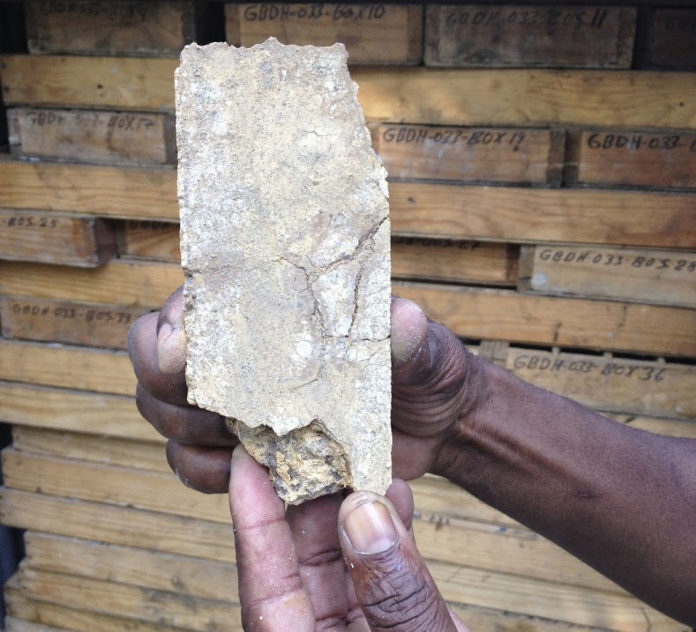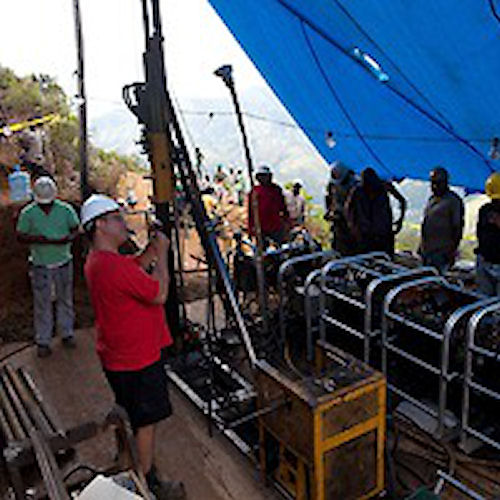
When Haiti’s Parliament reconvenes in January 2018, awaiting it will be a draft law that could start a gold rush in Haiti.
Drafted with the World Bank’s technical support in 2013 and 2014, the law would replace the current mining code. Company and government officials agree that the mining code is outdated and have identified it as the key obstacle to future mining of gold and other metals in Haiti’s soil. Despite repeated requests made by the Kolektif Jistis Min (KJM), a collective of Haitian social movement organizations that support communities affected by metal mining, the law before Parliament today has not been made available to the public.
The lack of access to information about Haiti’s mining sector is a longstanding problem. In 2013, the Haitian Senate passed a resolution calling for a moratorium on mining, citing the “opacity” of information about the country’s mineral resources. When, at the end of 2012, the Office of Mines and Energy granted three exploitation permits, which allow companies to build a mine, a Senator on the relevant oversight committee said that he learned of the permits on the radio.
A law of such consequence should not be passed without careful review of its contents. There is good reason to believe that the law in Parliament is similar, if not identical, to the draft law that the Global Justice Clinic (GJC) of the NYU School of Law obtained in 2014. GJC provides an extensive analysis of that draft mining law in its report co-authored with Hastings College of Law, Byen Konte, Mal Kalkile? Human Rights and Environmental Risks of Gold Mining in Haiti.

GJC found that this version of the draft law failed to protect Haiti’s environment, violated the Haiti’s 1987 Constitution, and did not respect the rights of Haitian communities. The law prioritized corporate interests over protecting the Haitian people’s well-being.
However, pending legislation must not distract us from the real issue: that mining, especially of gold, should not occur in Haiti at all.
Even in countries with more robust governance and oversight institutions than Haiti, industrial-scale mining has contaminated water resources, increased security threats, forcibly displaced thousands of people, and damaged entire ecosystems for generations. A report published by Earthworks in June 2017 of 27 gold mines in the United States concluded that 100% of the mines suffered at least one spill or accident and that 74% of the mines contaminated local water sources. As a Haitian colleague of mine wondered aloud: “Why would we expect our government to protect our water from toxic mine waste when they do not even dispose of trash?”
Breaking the right kind of ground, El Salvador’s parliamentarians last spring banned all gold and metal mining, a bold move their Haitian counterparts should study and ponder. As one Salvadorean lawmaker summed it up: “water won out over gold.”
Haiti suffers from both natural and human-made vulnerability to natural disasters. The 2010 earthquake killed tens of thousands of people. At the end of 2016, Hurricane Matthew blew through Haiti, causing an estimated $2 billion in damages, almost one-quarter of Haiti’s GDP. Although Hurricane Irma skirted Haiti to the north, its tropical storm winds and rain flooded entire towns and turned roads into rivers. The government’s inability to prepare for or to recover from the destruction wrought by hurricanes, droughts, and earthquakes is primarily due to decades – if not centuries – of anemic public institutions, environmental mismanagement, and counterproductive foreign intervention. Today, Haiti is considered one of the three countries in the world most vulnerable to the effects of climate change.
It is a near certainty that mining would take a devastating toll on Haiti’s already degraded environment. There is little evidence that the Haitian government will consider its own people’s interests in establishing and enforcing rules concerning mineral mining in the country. Officials from the Office of Mines and Energy have said that they only visit communities where companies have explored for gold when offered a ride in a company vehicle. Environment Ministry officials have complained that they do not have funds to visit affected areas, let alone to enforce no-go zones or to take water and soil samples to monitor contamination.
It is a near certainty that mining would take a devastating toll on Haiti’s already degraded environment.
Every day, Haiti provides the world with poignant reminders of injustice and contradiction: UN “peacekeeping” soldiers brought cholera to the country; millions of PetroCaribe dollars have been embezzled, while State coffers are so bare that the government provides free primary education to less than 10% of Haitian children; thousands of impoverished citizens languish in prolonged pretrial detention, while “bandi legal” (the criminal elite) enjoy positions of political power. Gold mining is held up as the path out of poverty, and yet its huge environmental risks strongly suggest that its promise for Haiti may be little more than a glittering mirage, masking a terrible danger.
Had it not been for the gold that Columbus observed adorning the native people of what is modern-day Haiti, Spanish colonists might not have enslaved the population to pan streams and dig mines for the precious metal. Gold was one of the reasons, nearly 400 years later, that the United States militarily occupied Haiti for 19 years. A few months before the U.S. Marines invaded in 1915, they stole, in an armed raid, half a million dollars in gold from Haiti’s national bank and shipped it to New York.
The U.S. government and multinational corporations already have much to answer for in Haiti, from supporting dictatorships and coups to destroying Haitian agriculture, industries, and livelihoods. Building an open pit mine in Haiti is a preventable disaster. Many Haitians, especially in the KJM and communities it serves, know the danger. If Haitian lawmakers allow it, it would be an act of historical amnesia.
Ellie Happel is the Haiti Project Director for the Global Justice Clinic of New York University School of Law. Since 2013, the Clinic has worked closely with the Kolektif Jistis Min (KJM), a coalition of Haitian human rights and social movement organizations that came together to monitor the development of the extractive industry in Haiti, who helped research the report Byen Konte, Mal Kalkile?. Ms. Happel, a North American attorney, has been based in Port-au-Prince since 2011.









